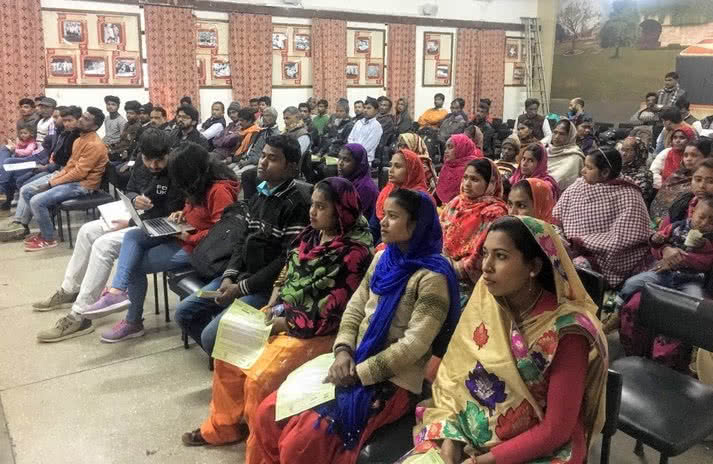Delhi Diary highlights reflections, insights and notes from the field from the Focal City Delhi (FCD) team in their ongoing work with informal workers. We capture these on a regular basis in order to provide a dynamic picture of the ways in which informal workers in Delhi are consistently struggling, resisting and innovating against great odds.
Women Speak - Workers’ Narrative for a Rapt Audience
by Marty Chen | March 29, 2019
On March 7th, on the eve of International Women’s Day, the WIEGO Delhi Focal City team organized (for the second year in a row) a “Women Speak – Workers’ Narrative” event hosted by the India Habitat Center. A panel of seven informal workers from Delhi City—one construction worker, three home-based workers, one street vendor and one waste picker—told their own stories, in their own words, to a large, rapt audience.
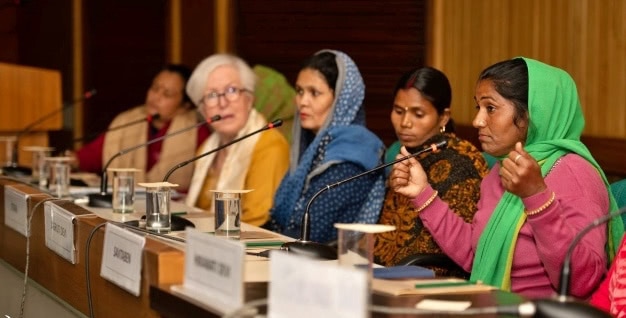
Each woman spoke about the importance of her work to herself and her family; the difficulties she faces in her work and her life; and the importance of being organized and affiliated with a support NGO.
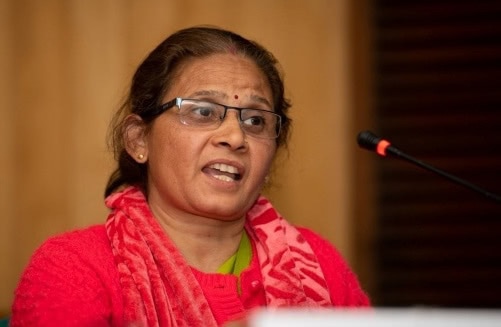 Hirawati Devi, a home-based worker affiliated with Jagori, reported that she initially had to hide the fact that she was working at home from her husband and in-laws but eventually gained independence and strength through her work:
Hirawati Devi, a home-based worker affiliated with Jagori, reported that she initially had to hide the fact that she was working at home from her husband and in-laws but eventually gained independence and strength through her work:
“I was not allowed to work despite having financial troubles at home only because I am a woman. If I managed to find some tailoring work, I had to hide what I was doing from my husband.”
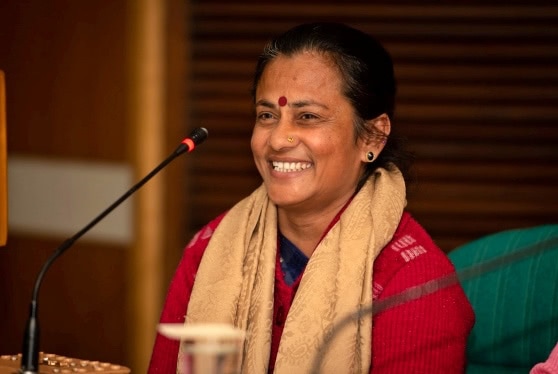 Usha-ben, a street vendor leader of SEWA Delhi, reported that she continued her education after joining SEWA (she passed her 10th standard exams in 2015). Usha barters utensils in exchange for used clothing from households, which she sells each Sunday at the weekly Women’s Market established by SEWA in 2009. Married at 15 to an unemployed man, Usha-ben stated:
Usha-ben, a street vendor leader of SEWA Delhi, reported that she continued her education after joining SEWA (she passed her 10th standard exams in 2015). Usha barters utensils in exchange for used clothing from households, which she sells each Sunday at the weekly Women’s Market established by SEWA in 2009. Married at 15 to an unemployed man, Usha-ben stated:
“My dreams ended when I married but being a member of SEWA has broadened my horizon. I have been able to do things that exceeded my imagination: including taking part in an international conference." (Usha-ben was a SEWA delegate to WIEGO’s General Assembly in Johannesburg, South Africa in November 2018).
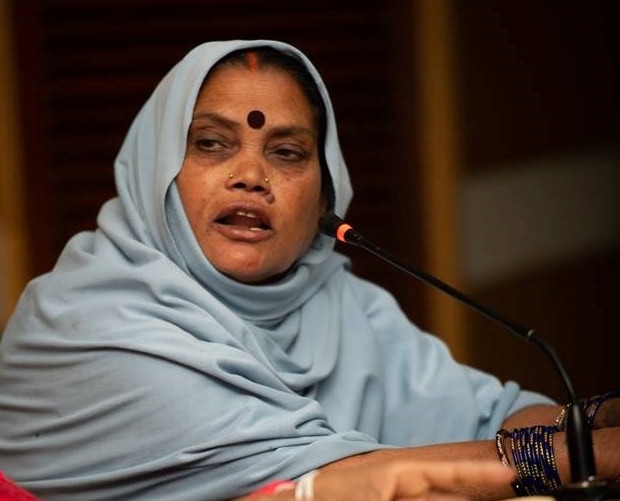 Guruvari-bai, a retired construction worker and member of Nirmana Mazdoor Panchayat Sangam, reported how, as a migrant construction worker for nearly three decades, she moved from place to place in search of work. Now, as a retired migrant worker, she faces barriers in accessing the pension to which she contributed over those years.
Guruvari-bai, a retired construction worker and member of Nirmana Mazdoor Panchayat Sangam, reported how, as a migrant construction worker for nearly three decades, she moved from place to place in search of work. Now, as a retired migrant worker, she faces barriers in accessing the pension to which she contributed over those years.
In 1996, the Government of India established a Construction Workers’ Board and Welfare Fund. Guruvari contributed to that fund throughout her work life and 1.5 years after retirement, received a lump sum of 60,000 rupees and monthly payments of 3600 rupees for several months. But she has received no payments in 2019. In 2018, the Government of India introduced the General Services Tax, stopping the cess/tax on the construction industry for the Construction Worker’s Welfare Fund. The Construction Worker’s Welfare Fund has accumulated anywhere from 400 million to 2 billion rupees in contributions and taxes; the issue is who do these funds belong to—the workers or the government?
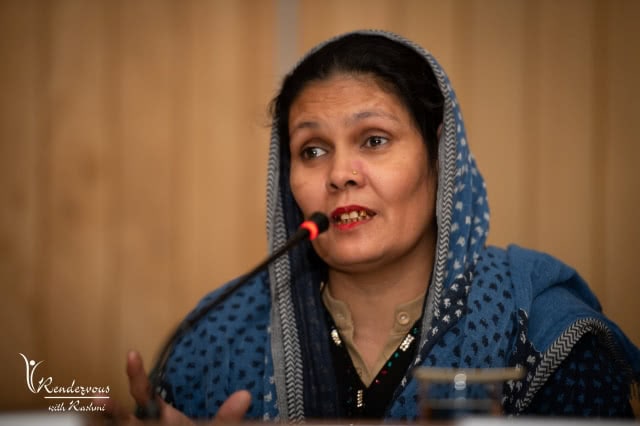 Sitara-bibi, a home-based worker affiliated with the Centre for Equity and Inclusion (CEQUIN), was relocated to Okhla Vihar where robbers stole all their possessions. Sitara stitches clothes at home and, through CEQUIN, gets embroidery work as well. Sitara proudly noted that her daughters and other young girls in their neighbourhood received soccer/football training, and that her elder daughter, introduced in the audience, played in a soccer tournament in the USA with her local team.
Sitara-bibi, a home-based worker affiliated with the Centre for Equity and Inclusion (CEQUIN), was relocated to Okhla Vihar where robbers stole all their possessions. Sitara stitches clothes at home and, through CEQUIN, gets embroidery work as well. Sitara proudly noted that her daughters and other young girls in their neighbourhood received soccer/football training, and that her elder daughter, introduced in the audience, played in a soccer tournament in the USA with her local team.
“My in-laws are upset that my daughters have stepped outside the house to play soccer and no longer speak to me. But I will do whatever is necessary, including cutting ties with my in-laws, to ensure that my daughters have a better future and all possible opportunities.”
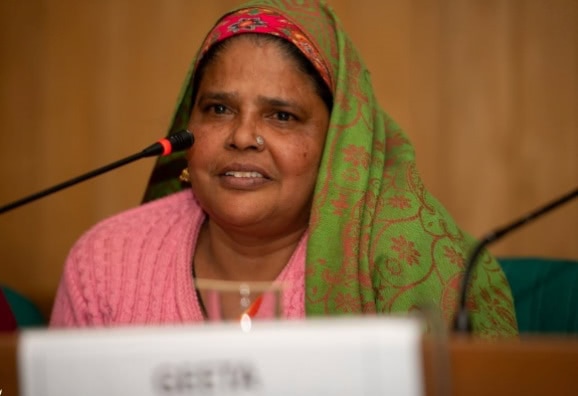
Geeta-ben, a domestic worker affiliated with Jagori, has to commute three hours every day (at a cost of 50-60 rupees per day depending on the traffic) to earn 4,000 rupees per month working in several households.
“Our employers are not bad people. They give us tea when we go, but there is a separate cup for me. (But) some people do not allow their maids to use toilets. We reach their homes on time and work inside for 8-10 hours. Our office is their home—but we cannot use their toilets. They forget they can go to work because we take care of their houses.”
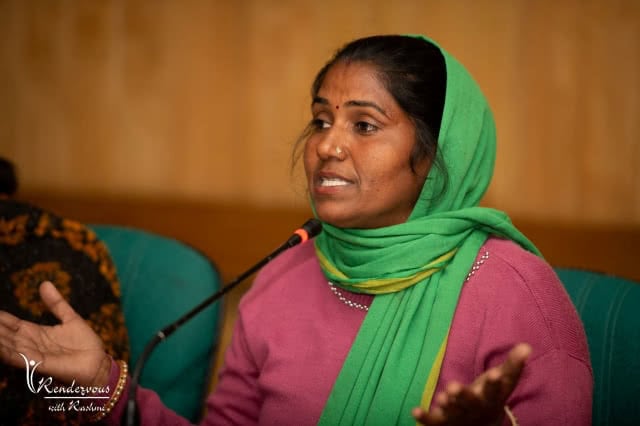 Savita-ben, a home-based worker, spoke about the difficulties she and her family faced when they were forcibly evicted from central New Delhi and resettled in Savda Ghevda (30 kilometers outside Delhi) in 2006. They had to lease the land on which they built their house. There was no water, no toilets, no schools, only two buses a day. Her husband, an electrician, could not find work. Formerly a construction worker, Savita began working as an agricultural day labourer but eventually took up home-based work—in part because women who had to leave the remote distant resettlement colony to seek work faced sexual harassment.
Savita-ben, a home-based worker, spoke about the difficulties she and her family faced when they were forcibly evicted from central New Delhi and resettled in Savda Ghevda (30 kilometers outside Delhi) in 2006. They had to lease the land on which they built their house. There was no water, no toilets, no schools, only two buses a day. Her husband, an electrician, could not find work. Formerly a construction worker, Savita began working as an agricultural day labourer but eventually took up home-based work—in part because women who had to leave the remote distant resettlement colony to seek work faced sexual harassment.
“Since we had to cross a jungle to go to the Tikri border (between Delhi and Haryana) to find work, we mostly travelled in groups. Three to four years ago, a group of men attacked four women. Three of them managed to flee but the one left behind was gang-raped.” From the audience, Savita’s teenage daughter added: “The woman’s body was thrown into a canal.”
Commenting on the public education slogan Beti Bachao, Beti Padhao (Save Daughters, Educate Daughters), Savita, who has four daughters, stated:
“I saved my own daughters, I educated them. But, now, I cannot always afford the 10 rupees each day that they need to take the bus to college. If my daughters cannot buy a ticket, the bus driver forces them to get off the bus and they miss their classes. It is not only my responsibility to provide for their survival and education. What about the government? We receive no support from government.”
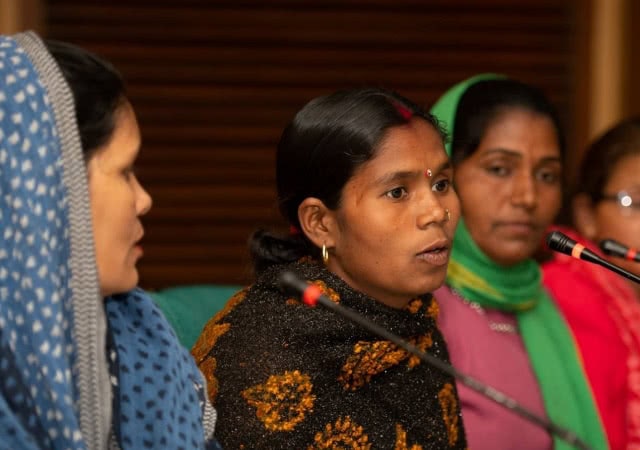 Jagruti-devi, a waste picker affiliated with Bal Vikas Dhara, sorts and bundles at their home, the waste that her husband collects. She spoke of the difficulty of getting her children educated, and the discrimination they face as children of waste pickers.
Jagruti-devi, a waste picker affiliated with Bal Vikas Dhara, sorts and bundles at their home, the waste that her husband collects. She spoke of the difficulty of getting her children educated, and the discrimination they face as children of waste pickers.
“Even when they go to school, they are sent back saying that they are dirty and other children will fall sick. What about our children’s education?”
Despite the odds they face each day, all of the women shared their dreams for the future: steady remunerative work, dignity in work, greater independence and a better life for their children, especially their daughters.
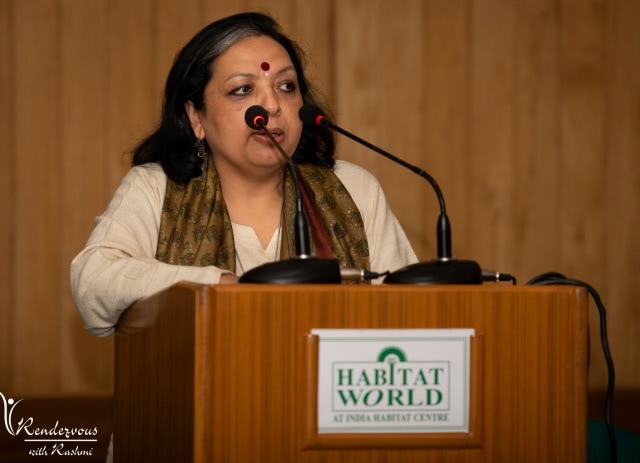 Shalini Sinha, WIEGO Delhi Focal City Coordinator, welcomed the audience and introduced the event; Marty Chen, WIEGO Senior Advisor, moderated the panel; and Kabir, coordinator of Alliance of Indian Waste Pickers (AIW), thanked the panelists, the audience, India Habitat Center and the organizations to which the panelists are affiliated: Bal Vikas Dhara, Centre for Equity and Inclusion (CEQUIN), Jagori, Nirmana Mazdoor Panchayat Sangam, SEWA Bharat and Mahila Housing Sewa Trust. This event would not have been possible without the support of these organizations.
Shalini Sinha, WIEGO Delhi Focal City Coordinator, welcomed the audience and introduced the event; Marty Chen, WIEGO Senior Advisor, moderated the panel; and Kabir, coordinator of Alliance of Indian Waste Pickers (AIW), thanked the panelists, the audience, India Habitat Center and the organizations to which the panelists are affiliated: Bal Vikas Dhara, Centre for Equity and Inclusion (CEQUIN), Jagori, Nirmana Mazdoor Panchayat Sangam, SEWA Bharat and Mahila Housing Sewa Trust. This event would not have been possible without the support of these organizations.
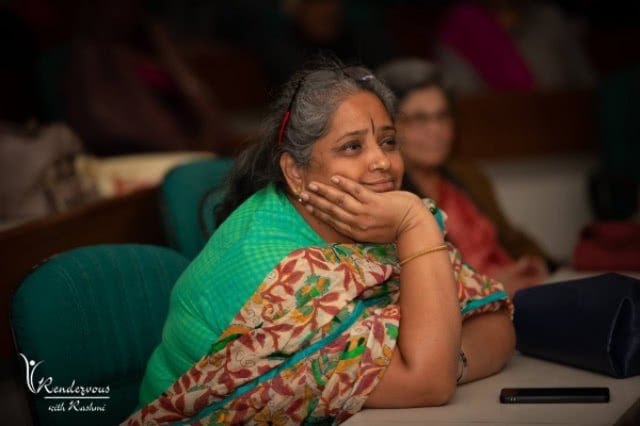 The Women Speak – Workers’ Narratives event was organized to help change how the public and the government think about the working poor, especially women, in the informal economy. The event was covered by English and Hindi media (see below).
The Women Speak – Workers’ Narratives event was organized to help change how the public and the government think about the working poor, especially women, in the informal economy. The event was covered by English and Hindi media (see below).
Positive feedback came from the audience and the women speakers. Savita-ben’s teenage daughter reported that she felt very proud of her mother. Usha-ben wrote on WhatsApp to say: “Itne samman tak pahuchane ke liye dhanyavaad” (“Thank you for bringing us to this position of respect”).
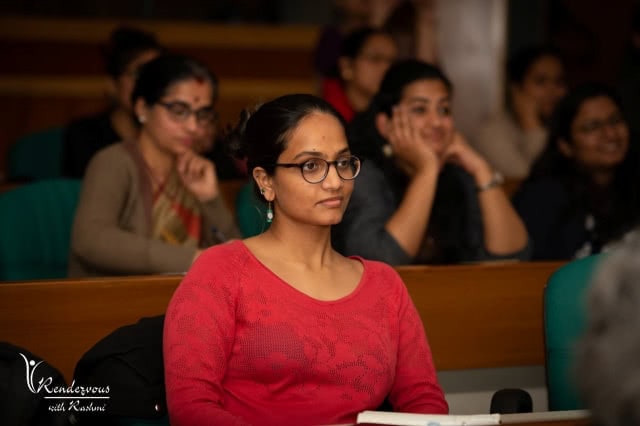 And one audience member summed up the event’s impact, writing: “It was soul stirring listening to women-workers at IHC New Delhi on the eve of International Women's Day… Their words are still ringing loudly in my head.”
And one audience member summed up the event’s impact, writing: “It was soul stirring listening to women-workers at IHC New Delhi on the eve of International Women's Day… Their words are still ringing loudly in my head.”
In their own voices: See videos of the women speaking (in Hindi)
Media Coverage of Women Speak
- Hindustan Times, "Suppression is commonplace for women in informal sector"
- Rajasthan Patrika (in Hindi)
- Dainik Jagran (in Hindi)
Master Plan of Delhi: Why do we need to engage with it?
March 7, 2019 | by Malavika Narayan
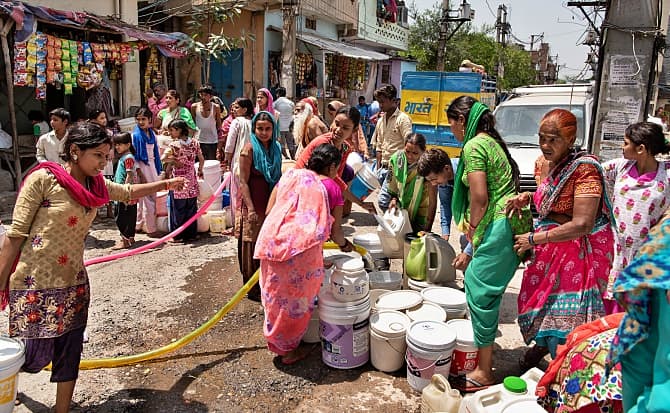
The year 2021 will bring into force a new Master Plan for Delhi which will determine the broad parameters of city development for the next 20 years. In a unique initiative, Focal Cities Delhi is facilitating a broad-based coalition of groups and individuals to demand that issues of livelihood, gender and habitat for the urban poor are adequately addressed in the plan. This diary entry explains why this is so important.
The Delhi Development Authority (DDA) defines the Master Plan as a ‘long-term perspective plan for guiding the sustainable planned development of the city.’ This macro-level document will determine the spatial aspect of how socio-economic activities in the city will be arranged and define the supporting infrastructure that is required by the city’s population.
Simply put, the Master Plan decides where in the city particular activities happen and how much area and supporting elements are required. It lays out a view about how the city should expand and look like in the future.
This important document will have big impact on how work and life happen in the city. The vision set out by the Master Plan is quoted in various other government documents and fundamentally guides other policies and programmes planned by different levels of the central, state and local governments. For instance, terms like ‘global metropolis’ and ‘world-class city’ to describe the aspirations of future development are repeated frequently, and set the tone for economic strategy, sectoral and other development plans. Moreover, as Delhi is the capital city, the Master Plan of Delhi is often viewed as a source of inspiration for other cities. Plans and norms established here have, in the past, been reflected in national policies and schemes as well.
The present Master Plan broke ground from earlier plans by opening up involvement of private actors in land assembly and development, expanding mixed-use zoning in residential areas and pushing for redevelopment of existing areas. However, it is imperative to recognise that the words of the plan are often unconnected to ground realities, a break that becomes more glaring when we remember that the present plan was passed even without conducting a survey of existing land use. Such a review is inconvenient for the state as it would reveal its past failures in its role as the sole provider of developed land and housing, a fact made evident from the single estimate that less than a third of Delhi’s population lives in ‘planned colonies.’
While it is acknowledged by various sources that the informal sector constitutes the majority of employment in Indian cities, the Master Plan of Delhi is completely silent on the needs of this part of the economy. The only informal sector mentioned is street vendors, though this is only a cursory nod to the vendors law without any attempt to translate the provisions therein to concrete space allocations for these workers. Other sectors like waste-pickers who contribute immensely to solid waste management, construction workers who are city-builders, and home-based workers who make their home their workplace are completely absent in the present plan.
A statutory document that is legally enforceable, the Plan has the force to declare all ‘violations’ to it as illegal and thereby render them insecure. The judiciary in India has often been the champion of the Plan and demanded its implementation from other arms of the government. This manifests in brutal evictions of people from self-built housing in what are termed ‘unauthorised colonies’ or ‘slums’ and of street vendors from areas declared ‘no-vending zones’. It also manifests in penalisation of work at home, as homes are meant to be used only for residential purposes, and in sealing drives against small commercial establishments operating in residential neighbourhoods, etc. Thus it can be seen that while the Plan may be based on an inaccurate understanding of existing realities, its power is such that it can alter developments post-facto and render people’s lives insecure if their livelihoods are not compliant with its dictates.
It is imperative that an instrument which has such power over people’s lives be subjected to public scrutiny. In Delhi however, planning remains an extremely centralised, top-down process which is deliberated only among technical experts. Call for public consultations has remained ineffective and failed to concretely reflect the needs of the people; these channels have only been accessible to groups like Residents Welfare Associations that lobby for the more well-off sections of the population. There is a real need, therefore, to make the process of planning more representative and accessible to all. Public participation starting from the initial stages of survey till the drafting and later during implementation will help make it more reflective of the needs of the people.
The importance of this Master Plan for the informal workforce cannot be stressed enough as their concentration in ‘informal settlements’ and involvement in work that happens in spaces outside of what are formally termed as ‘workplaces’ makes them particularly vulnerable. This can be challenged by a mobilisation of voices from different sectors who can make a political claim to alter the plan to reflect their realities and needs.
Voices from the Margins: Waste Pickers and the Right to the City
March 1, 2019 | by Avi Singh Majithia
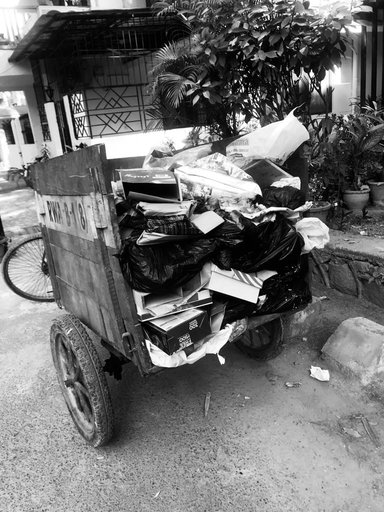
“We help keep the city clean but we have to live in filth. We work but are not recognized. Today we ask for the right to our identity.”
Delhi produces nearly 10,000 metric tonnes of garbage every day. Estimates show that there are between 200,000-300,000 waste pickers in Delhi, sorting and recycling waste. The Solid Waste Management Rules (2016), notified by Union Ministry of Environment, Forest & Climate Change under the Environment Protection Act (1985), have been a major policy win for waste pickers: for the first time, they have been officially acknowledged for their work to keep India’s cities clean. However, in the years since, the waste pickers of the city have continued to struggle to be recognized and included.
A coalition of waste picker organizations from across Delhi – The Delhi Roundtable on Solid Waste Management,supported by WIEGO Focal Cities (Delhi) in partnership with the Alliance of Indian Waste pickers (AIW) and Indo-Global Social Service Society (IGSSS)- are demanding that a clear path be laid out for recognition and integration of waste pickers. A charter of demands - “Waste is our Right” - lays out the demands of waste pickers of the city for “representation in waste management related policy-making processes”, “registration and enumeration of all waste pickers” and “involvement in waste collection and operation of waste management facilities.”; either by amending the existing by-laws or in any future waste management policies and strategies.
Waste pickers are largely migrants, so the lack of an identity tying them to the city further creates obstacles. Moving to the city to eke out a living, waste pickers often exist on the fringes, with no sense of claim to the city. In October 2018, the platform embarked on a city-wide campaign for recognising waste pickers and providing them with identity cards, as a first step to inclusion and integration into the city’s waste management systems. The campaign focused on community engagement to strengthen the demand for waste picker inclusion. Over the last two months, the member organisations of the platform have conducted community meetings with over 300 waste pickers in the city to present the solid waste management rules to them, and bring their issues and concerns to Delhi residents and city officials.
This exercise culminated in a public hearing on the Rights, Entitlement, Livelihood, Dignity and Identity Issues of waste pickers. Attended by over 100 waste pickers from 6 organizations, the hearing focused on the need for an occupational identity card for the waste pickers of Delhi.
Jasmine Khatoon, a waste picker from Shahbad Dairy in Delhi, recounted the many forms of harassment that she faces – from the residents, police and the municipal authorities. She spoke of how any form of identity helps establish her right to the city. “An occupational identity card will establish our right to work as waste pickers, and will let us access schemes and policies to make our lives better.” From children’s education to health services, waste pickers spoke of all the challenges in their life that would begin to be made easier with an occupational ID; not just in accessing their livelihood but also in proving their right to a city that has left them out on the margins.
